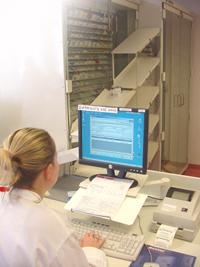
Buying prescription medicine via internetThe Internet has changed the way we live, work and shop. The growth of the Internet has made it possible to compare prices and buy products without ever leaving home. But when it comes to buying medicine online, it is important to be very careful. Some websites sell medicine that may not be safe to use and could put your health at risk. First, it's important to carefully consider the source of information and then to discuss the information you find with your health care professional. These questions and answers can help you determine whether the health information you find on the Internet or receive by e-mail from a Web site is likely to be reliable. Some websites that sell medicine can be not state-licensed pharmacies or aren't pharmacies at all; or may give a diagnosis that is not correct and sell medicine that is not right for you or your condition; or won't protect your personal information. Make sure the site requires a prescription and has a pharmacist available for questions.
The benefits and risks of medicinesBefore using any medicine--as with many things that you do every day--you should think through the benefits and the risks in order to make the best choice for you. There are several types of risks from medicine use: a) The possibility of a harmful interaction between the medicine and a food, beverage, dietary supplement (including vitamins and herbals), or another medicine. Combinations of any of these products could increase the chance that there may be interactions. b) The chance that the medicine may not work as expected. c) The possibility that the medicine may cause additional problems. For example, every time you get into a car, there are risks---the possibility that unwanted or unexpected things could happen. You could have an accident, causing costly damage to your car, or injury to yourself or a loved one. But there are also benefits to riding in a car: you can travel farther and faster than walking, bring home more groceries from the store, and travel in cold or wet weather in greater comfort. For example, if facing a life-threatening illness, you might choose to accept more risk in the hope of getting the benefits of a cure or living a longer life. On the other hand, if you are facing a minor illness, you might decide that you want to take very little risk. In many situations, the expert advice of your doctor, pharmacist, or other health care professionals can help you make the decision. Important: think it through and work together with your doctor, pharmacist, or other health care professional to better manage the benefits and risks of your medicines. Before use a medicine make sure you understand the directions; ask your doctor if you have questions or concerns. Always double check that you have the right medicine. Read and follow the directions on the label and the directions from your doctor, pharmacist, or other health care professional. If you stop the medicine or want to use the medicine differently than directed, consult with your health care professional. Ask your doctor always if there are interactions with any other medicines or dietary supplements (including vitamins or herbal supplements), beverages, or foods. Use the same pharmacy for all of your medicine needs, whenever possible.

|